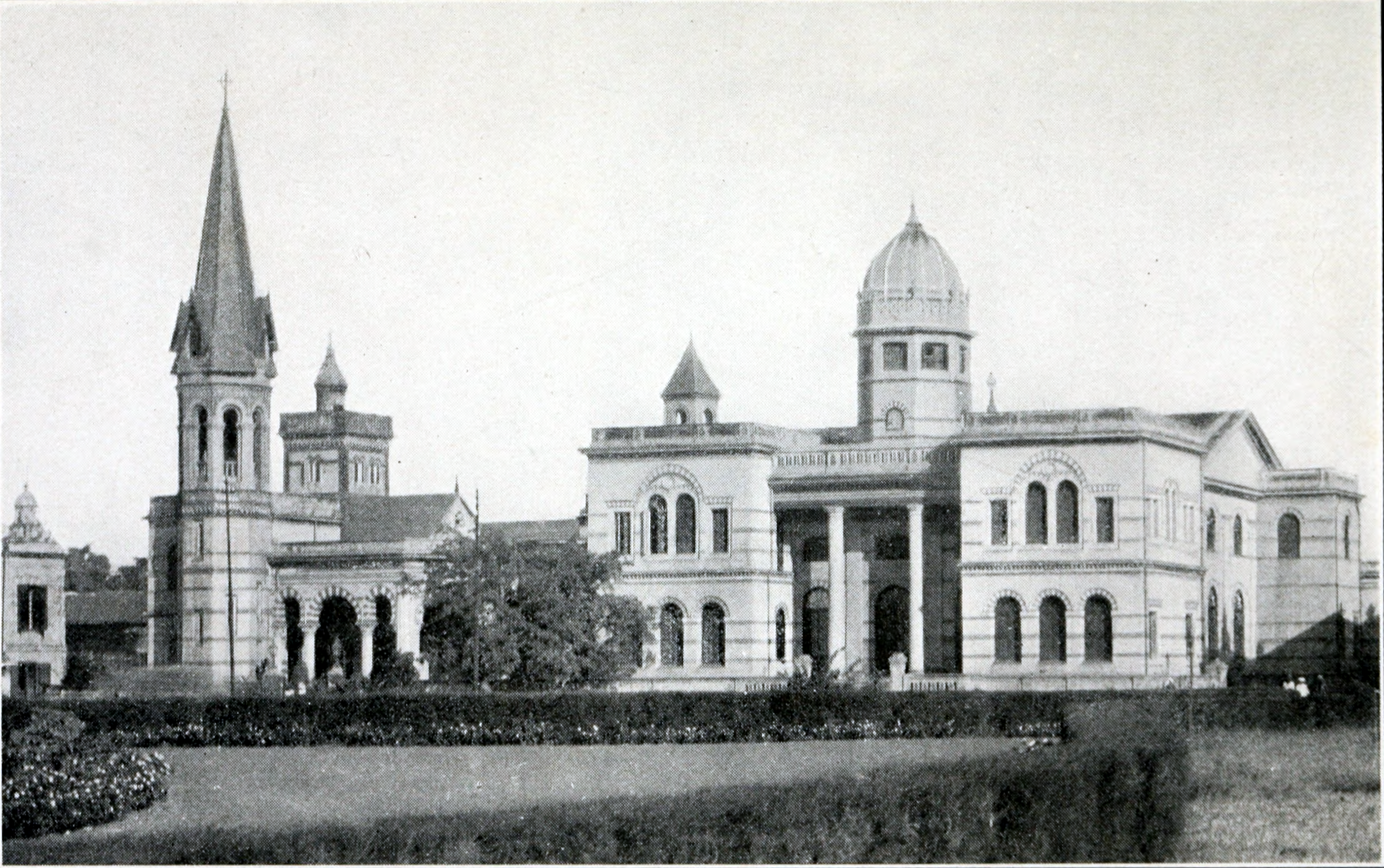|
Pattabhi Sitaramayya
Bhogaraju Pattabhi Sitaramayya (24 November 1880 – 17 December 1959) was an Indian independence activist and political leader in the state of Andhra Pradesh. He was also the first governor (1 November 1956 – 13 June 1957) of Madhya Pradesh. His books include ''Feathers and Stones'', ''The History of Congress'', and ''Gandhi and Gandhism''. Early life and education Born in Gundugolanu village, Krishna district (now part of Eluru district) in Andhra Pradesh to a Telugu Niyogi Brahmin family, Pattabhi graduated from the Madras Christian College, fulfilled his ambition to become a medical practitioner by securing a M.B.C.M. degree. Career Medical and early political career He started his practice as a doctor in the coastal town of Machilipatnam, headquarters of Krishna District and the political centre of Andhra. He left his lucrative practice to join the freedom fighting movement. During the years 1912–13, when there was a great controversy over the desirability of formin ... [...More Info...] [...Related Items...] OR: [Wikipedia] [Google] [Baidu] |
President Of The Indian National Congress
The national president of the Indian National Congress is the chief executive of the Indian National Congress (INC), one of the principal political parties in India. Constitutionally, the president is elected by an electoral college composed of members drawn from the Pradesh Congress Committees and members of the All India Congress Committee (AICC). In the event of any emergency because of any cause such as the death or resignation of the president elected as above, the most senior general secretary discharges the routine functions of the president until the Congress Working Committee, Working Committee appoints a provisional president pending the election of a regular president by the AICC. The president of the party has effectively been the party's national leader, head of the party's organisation, head of the Working Committee, the chief spokesman, and all chief Congress committees. After the party's foundation in December 1885, Womesh Chandra Bonnerjee, Womesh Chandra Banerj ... [...More Info...] [...Related Items...] OR: [Wikipedia] [Google] [Baidu] |
Ravishankar Shukla
Ravishankar Shukla (2 August 1877 — 31 December 1956) was a leader of the Indian National Congress, Indian independence movement activist, the Premier of the Central Provinces and Berar from 27 April 1946 to 25 January 1950, first Chief Minister of the reorganised Madhya Pradesh state from 1 November 1956 until his death on 31 December 1956, he was elected from Saraipali in Madhya Pradesh (now in Chhattisgarh). He also served as Member of Constituent Assembly of India from Central Provinces and Berar. Early life Born in a wealthy Kanyakubja Brahmin family, his father and grandfather were rich and scholarly. His ancestors belonged to district Unnao from Uttar Pradesh. His father, Pandit Jagganath Shukla, came of a family which had resisted British rulers for three generations and his mother, Tulsi Devi, was industrious and a capable manager. Young Ravishankar's earliest years were passed in a scholarly atmosphere heavily charged with Indian classics, Shri Ramcharit ... [...More Info...] [...Related Items...] OR: [Wikipedia] [Google] [Baidu] |
Madras Christian College
Madras Christian College (MCC) is a liberal arts and sciences college in Chennai, India. Founded in 1837, MCC is one of Asia's oldest extant colleges. The college is affiliated to the University of Madras but functions as an autonomous institution from its main campus in Tambaram, Chennai. It was established originally as a school for boys in the place where Anderson Church, Chennai, Anderson Church is located. From its origins as a missionary endeavor of the Church of Scotland, MCC's alumni and professors include several civil servants, administrators, educators, business people and political leaders. It was ranked 14th among colleges in India by the National Institutional Ranking Framework (NIRF) in 2024. History Beginnings MCC has its roots in a small school for boys established in 1835 when two chaplains of the Church of Scotland in Madras, Rev. George James Laurie and Rev. Matthew Bowie founded the St. Andrew's School on Randalls Road in Egmore, Madras. At their request, ... [...More Info...] [...Related Items...] OR: [Wikipedia] [Google] [Baidu] |
Diary
A diary is a written or audiovisual memorable record, with discrete entries arranged by date reporting on what has happened over the course of a day or other period. Diaries have traditionally been handwritten but are now also often digital. A personal diary may include a person's experiences, thoughts, and/or feelings, excluding comments on current events outside the writer's direct experience. Someone who keeps a diary is known as a diarist. Diaries undertaken for institutional purposes play a role in many aspects of human civilization, including government records (e.g. ''Hansard''), business ledgers, and military records. In British English, the word may also denote a preprinted journal format. Today the term is generally employed for personal diaries, normally intended to remain private or to have a limited circulation amongst friends or relatives. The word " journal" may be sometimes used for "diary," but generally a diary has (or intends to have) daily entries (f ... [...More Info...] [...Related Items...] OR: [Wikipedia] [Google] [Baidu] |
Maharashtra
Maharashtra () is a state in the western peninsular region of India occupying a substantial portion of the Deccan Plateau. It is bordered by the Arabian Sea to the west, the Indian states of Karnataka and Goa to the south, Telangana to the southeast and Chhattisgarh to the east, Gujarat and Madhya Pradesh to the north, and the Indian union territory of Dadra and Nagar Haveli and Daman and Diu to the northwest. Maharashtra is the second-most populous state in India, the third most populous country subdivision in South Asia and the fourth-most populous in the world. The state is divided into 6 divisions and 36 districts. Mumbai is the capital of Maharashtra due to its historical significance as a major trading port and its status as India's financial hub, housing key institutions and a diverse economy. Additionally, Mumbai's well-developed infrastructure and cultural diversity make it a suitable administrative center for the state, and the most populous urban are ... [...More Info...] [...Related Items...] OR: [Wikipedia] [Google] [Baidu] |
Ahmednagar
Ahmednagar, officially Ahilyanagar, is a city in, and the headquarters of, the Ahmednagar district, Maharashtra, India. Ahmednagar has several dozen buildings and sites from the Nizam Shahi period. Ahmednagar Fort, once considered almost impregnable, was used by the British Raj, British to house Jawaharlal Nehru (the first prime minister of India) and other Indian Nationalists before Indian independence. A few rooms there have been converted to a museum. During his confinement by the British at Ahmednagar Fort in 1944, Nehru wrote the book ''The Discovery of India''. Ahmednagar is home to the Indian Armoured Corps Centre & School (ACC&S), the Mechanised Infantry Regiment, Mechanised Infantry Regimental Centre (MIRC), the Vehicle Research and Development Establishment (VRDE) and the Controllerate of Quality Assurance Vehicles (CQAV). Training and recruitment for the Indian Army Armoured Corps takes place at the ACC&S. Ahmednagar is a relatively small town and shows less developm ... [...More Info...] [...Related Items...] OR: [Wikipedia] [Google] [Baidu] |
Congress Working Committee
The Congress Working Committee (CWC) is the executive committee of the Indian National Congress. It was formed in December 1920 at Nagpur session of INC which was headed by C. Vijayaraghavachariar. It is composed of senior party leaders and is responsible for taking decisions on important policy and organizational matters, as well as guiding and directing the party's activities and campaigns at the national level. It typically consists of fifteen members elected from the All India Congress Committee (AICC). The CWC is headed by the party president, who is elected by the members of the All India Congress Committee (AICC), the party's central governing body. The Working Committee has had different levels of power in the party at different times. In the period prior to Partition of India, Indian independence in 1947, the Working Committee was the centre of power, and the Working President was frequently more active than the Congress President. In the period after 1967, when the Con ... [...More Info...] [...Related Items...] OR: [Wikipedia] [Google] [Baidu] |
Telugu People
Telugu people (), also called Āndhras, are an Ethnolinguistic group, ethno-linguistic group who speak the Telugu language, Telugu language and are native to the India, Indian states of Andhra Pradesh, Telangana and Yanam district of Puducherry (union territory), Puducherry. They are the most populous of the four major Dravidian peoples, Dravidian linguistic groups. Telugu is the Languages of India, fourth most spoken language in India and the List of languages by number of native speakers, 14th most spoken native language in the world.Statistics in A significant number of Telugus also reside in the Indian states of Karnataka, Tamil Nadu, Odisha, Orissa, and Maharashtra. Members of the Telugu diaspora are spread across countries like Telugu Americans, United States, Indian Australians, Australia, Malaysian Telugu, Malaysia, Mauritius, United ... [...More Info...] [...Related Items...] OR: [Wikipedia] [Google] [Baidu] |
Tamil People
The Tamils ( ), also known by their endonym Tamilar, are a Dravidian ethnic group who natively speak the Tamil language and trace their ancestry mainly to the southern part of the Indian subcontinent. The Tamil language is one of the longest-surviving classical languages, with over two thousand years of written history, dating back to the Sangam period (between 300 BCE and 300 CE). Tamils constitute about 5.7% of the Indian population and form the majority in the South Indian state of Tamil Nadu and the union territory of Puducherry. They also form significant proportions of the populations in Sri Lanka (15.3%), Malaysia (7%) and Singapore (5%). Tamils have migrated world-wide since the 19th century CE and a significant population exists in South Africa, Mauritius, Fiji, as well as other regions such as the Southeast Asia, Middle East, Caribbean and parts of the Western World. Archaeological evidence from Tamil Nadu indicates a continuous history of human occupat ... [...More Info...] [...Related Items...] OR: [Wikipedia] [Google] [Baidu] |
Netaji
Subhas Chandra Bose (23 January 1897 – 18 August 1945) was an Indian independence movement, Indian nationalist whose defiance of British raj, British authority in India made him a hero among many Indians, but his wartime alliances with Nazi Germany and Japanese Fascism, Fascist Japan left a legacy vexed by authoritarianism, anti-Semitism, and military incompetence, military failure. * The honorific 'Netaji' (Hindustani language, Hindustani: "Respected Leader") was first applied to Bose in Germany in early 1942—by the Indian soldiers of the ''Indian Legion, Indische Legion'' and by the German and Indian officials in the Special Bureau for India in Berlin. It is now used throughout India. Bose was born into wealth and privilege in a large Bengalis, Bengali family in Orissa during the British Raj. The early recipient of an Anglocentrism, Anglo-centric education, he was sent after college to England to take the Indian Civil Service examination. He succeeded with distincti ... [...More Info...] [...Related Items...] OR: [Wikipedia] [Google] [Baidu] |
Netaji Subash Chandra Bose
Subhas Chandra Bose (23 January 1897 – 18 August 1945) was an Indian nationalist whose defiance of British authority in India made him a hero among many Indians, but his wartime alliances with Nazi Germany and Fascist Japan left a legacy vexed by authoritarianism, anti-Semitism, and military failure. * The honorific 'Netaji' ( Hindustani: "Respected Leader") was first applied to Bose in Germany in early 1942—by the Indian soldiers of the '' Indische Legion'' and by the German and Indian officials in the Special Bureau for India in Berlin. It is now used throughout India. Bose was born into wealth and privilege in a large Bengali family in Orissa during the British Raj. The early recipient of an Anglo-centric education, he was sent after college to England to take the Indian Civil Service examination. He succeeded with distinction in the first exam but demurred at taking the routine final exam, citing nationalism to be the higher calling. Returning to India in 192 ... [...More Info...] [...Related Items...] OR: [Wikipedia] [Google] [Baidu] |








